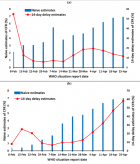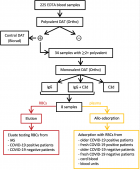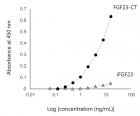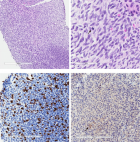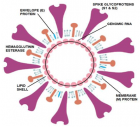Abstract
Short Communication
Changes in Private Psychiatric Outservice Related to SARS-CoV-2 Pandemic
Pier Luigi Marconi* and Rosamaria Scognamiglio
Published: 08 November, 2024 | Volume 8 - Issue 3 | Pages: 121-125
The SARS-CoV-2 pandemic, which began in late 2019, initially manifested with acute respiratory symptoms, including bilateral pneumonia, and later emerged as a systemic disease. This brief report assesses changes in the clinical profiles of psychiatric outpatients before, during, and after the pandemic’s most severe periods, focusing on mood, anxiety, and cognitive symptoms. Data from a private psychiatric facility in Rome reveal that both pandemic-related stressors and SARS-CoV-2 infection itself may contribute to enduring affective and cognitive symptoms in both older and younger adult subgroups. Notably, during the pandemic, older patients showed elevated psychopathology scores (BPRS-24) compared to younger individuals. In the post-pandemic period, younger adults exhibited increased positive symptoms on the PANSS Positive subscale, suggesting a gradual worsening in symptoms post-pandemic ( = 0.47). Cognitive assessments (MMSE and PM38) further highlighted fluctuating performance over time, with older adults showing two distinct declines during the pandemic and in 2024. This work underscores the importance of sustained mental health interventions to address the pandemic’s psychosocial and neuroinflammatory legacy. This perspective also considers new data on the CNS effects of “toxin-like peptides” synthesized by microbiome bacteria.
Read Full Article HTML DOI: 10.29328/journal.acr.1001110 Cite this Article Read Full Article PDF
Keywords:
Outpatients psychiatric services; Clinical profile shifts; Neuro Covid; Long Covid; Age differences
References
- Zhang X, Wang F, Shen Y, Zhang X, Cen Y, Wang B, et al. Symptoms and health outcomes among survivors of COVID-19 infection 1 year after discharge from hospitals in Wuhan, China. JAMA Netw Open. 2021;4(9). Available from: https://doi.org/10.1001/jamanetworkopen.2021.27403
- Davis HE, Assaf GS, McCorkell L, Wei H, Low RJ, Re'em Y, et al. Characterizing long COVID in an international cohort: 7 months of symptoms and their impact. EClinicalMedicine. 2021;38:101019. Available from: https://doi.org/10.1016/j.eclinm.2021.101019
- World Health Organization. A clinical case definition of post-COVID-19 condition by a Delphi consensus, 6 October 2021. World Health Organization [Internet]. 2021 [cited 2022 Mar 31]. Available from: https://shorturl.at/Vibfh
- US Centers for Disease Control and Prevention. Long COVID or post-COVID conditions. US Centers for Disease Control and Prevention, 2022.
- Premraj L, Kannapadi NV, Briggs J, Seal SM, Battaglini D, Fanning J, et al. Mid and long-term neurological and neuropsychiatric manifestations of post-COVID-19 syndrome: A meta-analysis. J Neurol Sci. 2022;434:120162. Available from: https://doi.org/10.1016/j.jns.2022.120162
- Taquet M, Skorniewska Z, De Deyn T, Hampshire A, Trender WR, et al. PHOSP-COVID Study Collaborative Group. Cognitive and psychiatric symptom trajectories 2-3 years after hospital admission for COVID-19: A longitudinal, prospective cohort study in the UK. Lancet Psychiatry. 2024 (24)00214-1. Available from: https://doi.org/10.1016/s2215-0366(24)00214-1
- Whitaker M, Elliott J, Chadeau-Hyam M, Riley S, Darzi A, Cooke G, et al. Persistent COVID-19 symptoms in a community study of 606,434 people in England. Nat Commun. 2022;13:1957. Available from: https://doi.org/10.1038/s41467-022-29521-z
- Office for National Statistics. Self-reported coronavirus (COVID-19) infections and associated symptoms, England and Scotland: November 2023 to March 2024. Office for National Statistics. Available from: https://shorturl.at/63U9D
- Amadoro G, Latina V, Stigliano E, Micera A. COVID-19 and Alzheimer's disease share common neurological and ophthalmological manifestations: A bidirectional risk in the post-pandemic future. Cells. 2023;12(22):2601. Available from: https://doi.org/10.3390/cells12222601
- Brogna C, Cristoni S, Petrillo M, Querci M, Piazza O, et al. Toxin-like peptides in plasma, urine, and faecal samples from COVID-19 patients. F1000Res. 2021;10:550. Available from: https://doi.org/10.12688/f1000research.54306.2
- Brogna C, Cristoni S, Brogna B, Bisaccia DR, Marino G, Viduto V, et al. Toxin-like peptides from the bacterial cultures derived from gut microbiome infected by SARS-CoV-2—New data for a possible role in the long COVID pattern. Biomedicines. 2022;11(1):87. Available from: https://doi.org/10.3390/biomedicines11010087
Figures:

Figure 1

Figure 2

Figure 3
Similar Articles
-
Is Acupuncture Efficient for Treating Long COVID? Case ReportsDavid Lake*, Philippe Poindron. Is Acupuncture Efficient for Treating Long COVID? Case Reports. . 2024 doi: 10.29328/journal.acr.1001107; 8: 110-115
Recently Viewed
-
Various Theories of Fast and Ultrafast Magnetization DynamicsManfred Fähnle*. Various Theories of Fast and Ultrafast Magnetization Dynamics. Int J Phys Res Appl. 2024: doi: 10.29328/journal.ijpra.1001101; 7: 154-158
-
Nitrogen Fixation and Yield of Common Bean Varieties in Response to Shade and Inoculation of Common BeanSelamawit Assegid*,Girma Abera. Nitrogen Fixation and Yield of Common Bean Varieties in Response to Shade and Inoculation of Common Bean. J Plant Sci Phytopathol. 2023: doi: 10.29328/journal.jpsp.1001122; 7: 157-162
-
Peripheral perfusion index in critically ill COVID-19 and its association with multiorgan dysfunctionCornu Matias German*, Tonelier Matias, Roel Pedro, Sanhueza Laura, Orozco Sergio Martin, Sepulveda Mariana Elizabet, Svampa Silvana Enrica, Arana Osorio Erick and Martinuzzi Andres Luciano Nicolas. Peripheral perfusion index in critically ill COVID-19 and its association with multiorgan dysfunction. J Clin Intensive Care Med. 2023: doi: 10.29328/journal.jcicm.1001043; 8: 004-013
-
Dalbavancin and moleculight in the COVID-19 pandemicWayne J Caputo*, George Fahoury, Donald Beggs, Patricia Monterosa. Dalbavancin and moleculight in the COVID-19 pandemic. J Clin Intensive Care Med. 2023: doi: 10.29328/journal.jcicm.1001042; 8: 001-003
-
Development of Latent Fingerprints Using Food Coloring AgentsKallu Venkatesh,Atul Kumar Dubey,Bhawna Sharma. Development of Latent Fingerprints Using Food Coloring Agents. J Forensic Sci Res. 2024: doi: 10.29328/journal.jfsr.1001070; 8: 104-107
Most Viewed
-
Evaluation of Biostimulants Based on Recovered Protein Hydrolysates from Animal By-products as Plant Growth EnhancersH Pérez-Aguilar*, M Lacruz-Asaro, F Arán-Ais. Evaluation of Biostimulants Based on Recovered Protein Hydrolysates from Animal By-products as Plant Growth Enhancers. J Plant Sci Phytopathol. 2023 doi: 10.29328/journal.jpsp.1001104; 7: 042-047
-
Sinonasal Myxoma Extending into the Orbit in a 4-Year Old: A Case PresentationJulian A Purrinos*, Ramzi Younis. Sinonasal Myxoma Extending into the Orbit in a 4-Year Old: A Case Presentation. Arch Case Rep. 2024 doi: 10.29328/journal.acr.1001099; 8: 075-077
-
Feasibility study of magnetic sensing for detecting single-neuron action potentialsDenis Tonini,Kai Wu,Renata Saha,Jian-Ping Wang*. Feasibility study of magnetic sensing for detecting single-neuron action potentials. Ann Biomed Sci Eng. 2022 doi: 10.29328/journal.abse.1001018; 6: 019-029
-
Pediatric Dysgerminoma: Unveiling a Rare Ovarian TumorFaten Limaiem*, Khalil Saffar, Ahmed Halouani. Pediatric Dysgerminoma: Unveiling a Rare Ovarian Tumor. Arch Case Rep. 2024 doi: 10.29328/journal.acr.1001087; 8: 010-013
-
Physical activity can change the physiological and psychological circumstances during COVID-19 pandemic: A narrative reviewKhashayar Maroufi*. Physical activity can change the physiological and psychological circumstances during COVID-19 pandemic: A narrative review. J Sports Med Ther. 2021 doi: 10.29328/journal.jsmt.1001051; 6: 001-007

HSPI: We're glad you're here. Please click "create a new Query" if you are a new visitor to our website and need further information from us.
If you are already a member of our network and need to keep track of any developments regarding a question you have already submitted, click "take me to my Query."







